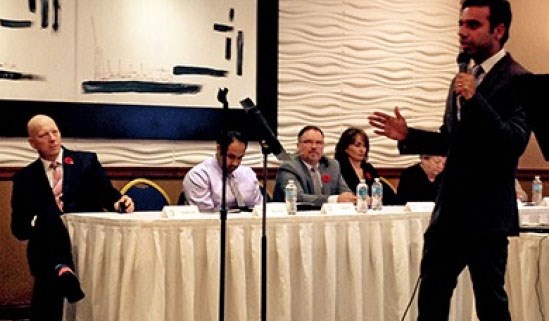The Wild West days of unlimited spending in municipal election campaigns are about to end.
The provincial government has tabled legislation that will cap how much would-be mayors and councillors can spend on advertising and other costs in future election years, starting in 2018.
The permitted spending amounts vary by the size of each municipality according to a population-based formula.
It works out to $10,000 for mayoral candidates in cities of up to 10,000 people, rising to $89,250 for a population of 150,000, and reaching $149,250 for a city of 250,000.
The new rules won't do much to affect Tri-City mayoralty candidates, whose campaigns spent well within those limits in 2014.
Expense records show Richard Stewart, Coquitlam mayor, spent the most at $73,380, followed by his opponent, Lou Sekora, who spent $67,061, records show. The order of expenditures for other mayoralty candidates are as follows: Gaetan Royer, who spent $59,528 to challenge Port Moody Mayor Mike Clay, Port Coquitlam mayor Greg Moore who spent $38,491* Clay spent $41,239 to keep his seat and PoCo Mayor Greg Moore's opponent, Eric Hirvonen, spent the least, $4,895, on his mayorlty bid.
Meanwhile, an extra 15 cents per capita is added after 250,000 for the biggest cities, meaning future mayors will be able to spend no more than $184,000 in Surrey and $205,000 in Vancouver.
Spending by councillors, regional district directors and school trustees would be capped at half the limit of mayors in their areas.
"I think they've got this right," said Dermod Travis, executive director for Integrity B.C., adding the sliding scale reflects the different needs of small and large communities.
"It's unfortunate the other half of the equation is not being tackled at the same time, which would be donations. But I think they've found a good middle for where those caps should be on expenses."
It will make it harder for well-funded candidates to use advertising firepower to beat their opponents, he predicted.
"You're going to see less money getting spent, which means candidates have to raise less money. Which means that they're actually going to have to campaign more in terms of meeting voters rather than buying ads."
The recommendations were developed by a special legislative committee and have support of both the BC Liberals and NDP, as well as the Union of B.C. Municipalities.
Travis said the new spending caps would have forced many winning candidates to spend less than they did in the 2014 local government elections.
According to the committee report, 31 mayoral candidates and 69 council candidates across B.C. spent more last year than the proposed new limit will allow.
The expense limits would apply from Jan. 1 of the election year until voting day.
Third-party advertisers are to be limited to spending no more than five per cent of the cap of a candidate within a 28-day campaign period, up to a cumulative maximum of $150,000 province-wide.
The government is taking public comments in a final round of consultations until Nov 27 before the bill is expected to pass.
* The original story has been corrected to reflect Mayor Greg Moore's expenses, an incorrect figure was originally posted.



